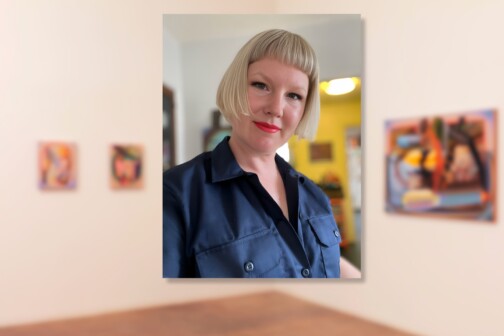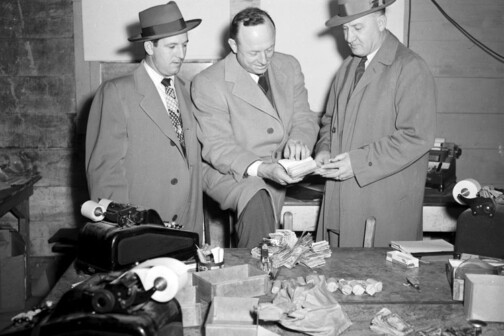 |
| PASS THE SALT: “Dallas is traditionally about things like glitz and fancy clothes, about what’s outside,” says Kitchen 1924 owner Shawn Horne. “Community dining breaks down those barriers.” |
It’s not that we haven’t all done “communal dining.” Back then you called it something else: the high school cafeteria.
But by the time you’re old enough to pay for your own lunch at Luby’s, the last thing you want is to crash someone else’s table. Especially in Texas, where the one thing we do have, by golly, is space. What on earth would possess you to barge in on a total stranger?
So it’s no surprise that the communal dining trend comes late to Dallas, behind more congested cities like New York and Chicago, where close physical contact is part of everyday life. Sitting elbow to elbow over a sandwich at Le Pain Quotidien (the Brussels-spawned bakery chain known for its community tables) differs only marginally from the routine jostling one does daily on the subway.
But look out. The communal table is here, now, at Stephan Pyles and Jeroboam downtown; at Kitchen 1924 in Lakewood; at Sushi Sake in Richardson; and at the soon-to-open Harper’s Corner, in the newly refurbished Hotel Palomar. With its arrival comes a set of amusing cultural quandaries, some of which challenge our assumptions about what’s acceptable when dining out among strangers. At the very least, as restaurant designer Paul Draper puts it, “When you sit at a communal table, it’s essential to know that someone else may be sitting there, too.”
It’s not that we’re opposed to meeting new people. Humans are a social species. But that doesn’t make it any less awkward to start up a conversation with someone you don’t know. The communal table erases that awkwardness. Its engineered proximity practically forces you to be civilized, to offer a nod of acknowledgement to your neighbors, even to say hello—without the risk of looking like a pathetic loser who’s desperate for contact.
Perhaps you’ve heard of people who’ve been subjected to tight encounters, such as getting stuck in an elevator together, in which the victims emerge with a sense of camaraderie once it’s all over. Communal tables don’t have quite that level of drama, but they do create a situation in which you find yourself “having” to interact with people with whom the ice would otherwise never be broken.
You might, for example, enjoy an exchange with Lynn and Sam Coury of Oklahoma City, and their son Jimmy. They were having dinner on a recent weeknight at the 20-seat community table at Stephan Pyles because they didn’t have a reservation. Over plates of sea bass and bone-in ribeye, you might learn that Jimmy, 38, who recently moved to Dallas, is teaching himself about wine by focusing on one varietal at a time. (He’s currently on Pinot Noir.) Or that his parents travel a lot and are thus wise to the ways of communal dining.
On a recent trip to Santa Fe, Lynn and Sam observed community tables at Cafe Pasqual’s and Cloud Cliff Bakery.
As a result, says Sam, “If I see strangers sitting by themselves, I’ll invite them to our table.”
To those who wonder if Texans are insufficiently social to share a table, Sam replies, “You just haven’t met a real Texan yet.”
At Kitchen 1924, communal dining takes up half of the restaurant’s space, with four tables—beautiful, pale wooden planks fashioned from recycled bowling alleys—that seat about 10 each. When not being squatted by large parties, they fulfill the idyllic vision of owner Shawn Horne, who wanted to duplicate a friendly dinner he experienced at Avec, a cozy, all-communal restaurant and wine bar in Chicago. “Dallas is traditionally about things like glitz and fancy clothes, about what’s outside,” he says. “Community dining breaks down those barriers.”
On weeknights when the restaurant isn’t full, the community tables sit empty; there’s something discomforting about sitting at a huge table all by your lonesome. But on weekends, when the place gets jammed, so do the big tables, and a festive, medieval-banquet unruliness starts to sprout.
At Sushi Sake, the cult sushi spot in Richardson, the community tables take on the most utilitarian, egalitarian tenor of all. Booths are in limited supply here, increasing the odds that you’ll be seated at one of the shared tables. Everyone, servers and customers alike, exhibits a worldly blasé about the arrangement. This instantly quashes any protest rising in the back of your throat. What’s your problem? You afraid of strangers?
And, so, to the communal table you are led. This doesn’t mean that, once seated, you won’t gaze over at the booths, your eyes narrowed, laser-ing the two guys in baseball caps yukking it up, and silently ask yourself, “How come they get a booth?”
But once you settle in to the six-top, which you find you are sharing with three Asian guys in their 20s, the inner grumbling fades. For one thing, those three guys clearly know their way around the menu a whole lot better than you do. There’s no way you would’ve thought to order the niku tofu soup, with its paper-thin slices of tender beef, if you hadn’t seen them eating it.
And while you probably won’t go so far as to join them later for rounds of sake, you find yourself sharing some neighborly eye contact, maybe even a shy smile or two, and it strikes you that you do have something in common after all.
Get our weekly recap
Related Articles

Raychael Stine’s Technicolor Return to Dallas

Tales from the Dallas History Archives: Scenes from 1949, When the Mob Ruled Dallas



